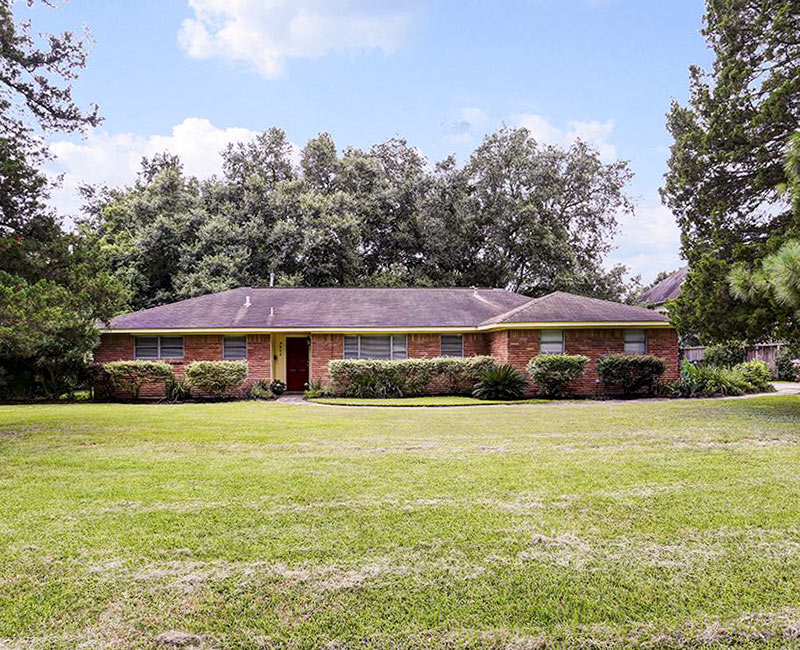
It’ll take time to work the knots out.
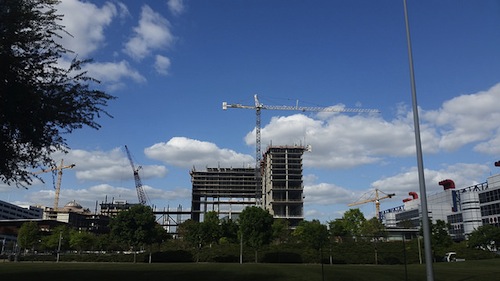
Photo of Marriott Marquis Convention Center Hotel: Marc Longoria via Swamplot Flickr Pool
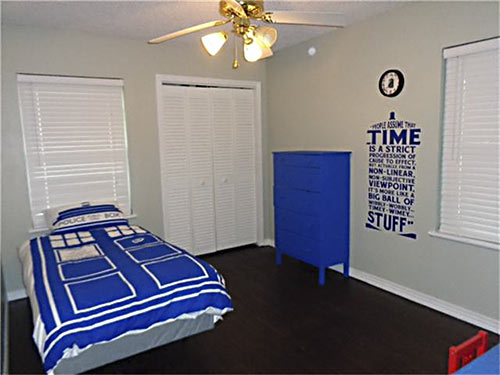
COMMENT OF THE DAY: HOW THOSE NEW FIFTH WARD DRIVEWAYS CAME TO REACH ALL THE WAY INTO THE MIDDLE OF THE STREET 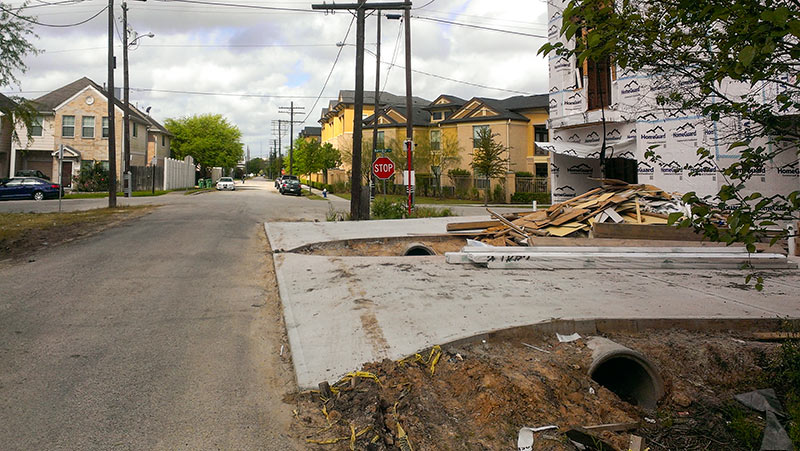 “Here’s how you get to this point.
(i) Neighborhood gets built with gravel streets, ditch drainage.
(ii) City goes in and widens most of the streets in the neighborhood in the 1960s. 40′ asphalt, curb and gutter. Baron St. misses out on the neighborhood-wide repave because it has a railroad track in the middle.
(iii) Railroad track gets abandoned, trackbed gets paved over, no one ever improves Baron.
(iv) Townhome developer comes in and wants to put in a driveway. Houston Infrastructure Design Manual says any culvert in City right-of-way has to be 24″ minimum. Developer’s engineer knows if he touches that old 60s curb inlet he’ll have to replace it to current spec, better to match the flowline and save eight or ten large. Culverts go in and look huge because 24″ on top of the existing flowline is above the crown of the road.
(v) Swamplot readers are confused because the 60s-era curb and gutter doesn’t match the existing right-of-way.” [Purple CIty, commenting on Here’s One Way To Get Extra Long Driveways for Your Fifth Ward Townhome] Photo: Swamplot inbox
“Here’s how you get to this point.
(i) Neighborhood gets built with gravel streets, ditch drainage.
(ii) City goes in and widens most of the streets in the neighborhood in the 1960s. 40′ asphalt, curb and gutter. Baron St. misses out on the neighborhood-wide repave because it has a railroad track in the middle.
(iii) Railroad track gets abandoned, trackbed gets paved over, no one ever improves Baron.
(iv) Townhome developer comes in and wants to put in a driveway. Houston Infrastructure Design Manual says any culvert in City right-of-way has to be 24″ minimum. Developer’s engineer knows if he touches that old 60s curb inlet he’ll have to replace it to current spec, better to match the flowline and save eight or ten large. Culverts go in and look huge because 24″ on top of the existing flowline is above the crown of the road.
(v) Swamplot readers are confused because the 60s-era curb and gutter doesn’t match the existing right-of-way.” [Purple CIty, commenting on Here’s One Way To Get Extra Long Driveways for Your Fifth Ward Townhome] Photo: Swamplot inbox
COMMENT OF THE DAY RUNNER-UP: RETAIL CHAIN SLEEP SYNERGY  “I wonder if Mattress Firm/Pro geographically correlate with CVS/Walgreens stores, i.e. the drug sellers who provide customers with the means (Ambien, Lunesta) to enjoy a full and long-lasting experience on their newly purchased mattresses.” [Larry, commenting on How and Where Mattress Firm Is Conquering Houston, One Sleepy Strip Center Storefront at a Time] Illustration: Lulu
“I wonder if Mattress Firm/Pro geographically correlate with CVS/Walgreens stores, i.e. the drug sellers who provide customers with the means (Ambien, Lunesta) to enjoy a full and long-lasting experience on their newly purchased mattresses.” [Larry, commenting on How and Where Mattress Firm Is Conquering Houston, One Sleepy Strip Center Storefront at a Time] Illustration: Lulu
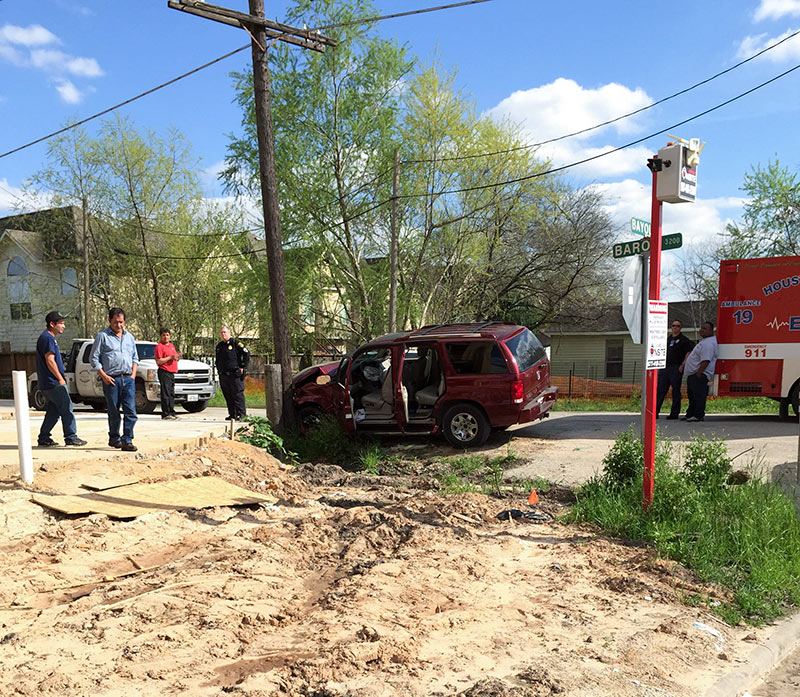
 As a cautionary demonstration of the hazards of the kind of wacky old-roadway-meets-new-driveway construction found in front of a set of under-construction townhomes at the corner of Bayou and Baron streets in the Fifth Ward, the accident pictured here doesn’t quite hold up to extended scrutiny. Sure, it might be tough for a vehicle to stay on the asphalt when a stretch of roadway suddenly disappears and new concrete driveways stretch across it (as illustrated in the second photo above). But here the damaged Escalade appears to have crashed into a stationary hazard on the opposite side of the street.
As a cautionary demonstration of the hazards of the kind of wacky old-roadway-meets-new-driveway construction found in front of a set of under-construction townhomes at the corner of Bayou and Baron streets in the Fifth Ward, the accident pictured here doesn’t quite hold up to extended scrutiny. Sure, it might be tough for a vehicle to stay on the asphalt when a stretch of roadway suddenly disappears and new concrete driveways stretch across it (as illustrated in the second photo above). But here the damaged Escalade appears to have crashed into a stationary hazard on the opposite side of the street.
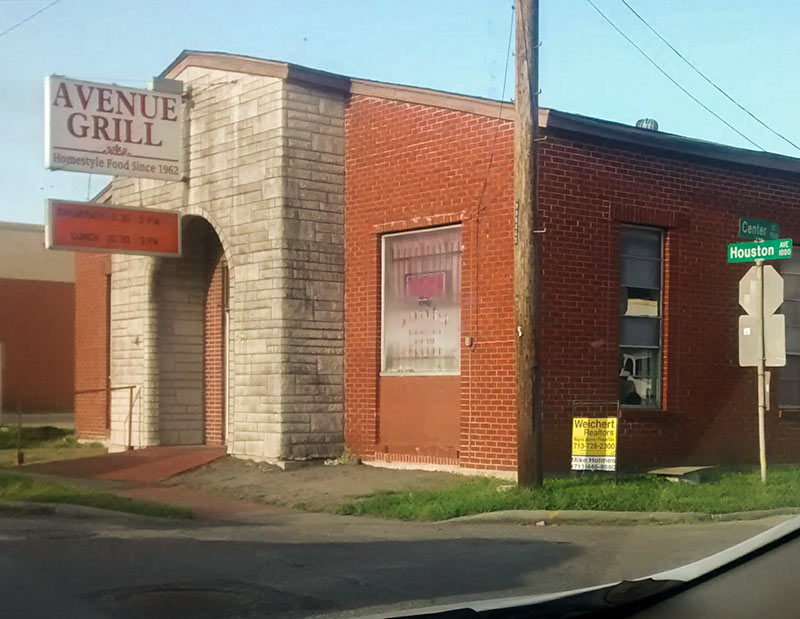
The Avenue Grill could close sometime soon, but not if somebody doesn’t hurry up and buy the place. Or maybe buy the place and keep it running for the cops, firefighters, judges, judges, lawyers, and other frequenters of the neighboring municipal court and police complex that regularly eat breakfast and lunch there? To hasten either outcome, a small sign went up a week or 2 ago at the corner of Houston Ave. and Center St., a block north of Washington Ave., indicating that the 1940 building and a total of 19,600 sq. ft. of land is available for sale. That spurred attention from a Swamplot reader who — like most people — hadn’t been aware that the property had been on the market since last August.
The $1.5 million asking price includes 4 lots — one where the building sits at 1017 Houston Ave., 2 adjacent parking lots, and an additional surface parking lot across Center St., just where the Houston Ave. underpass begins. That lot is visible just beyond the building in this view from the corner of Washington Ave:

Photo of Greenway Plaza: Russell Hancock via Swamplot Flickr Pool
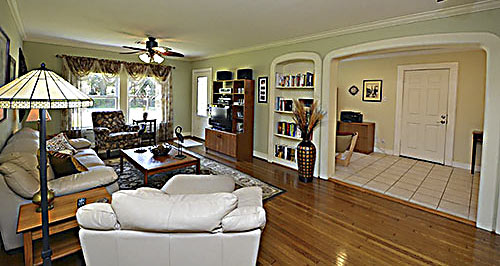
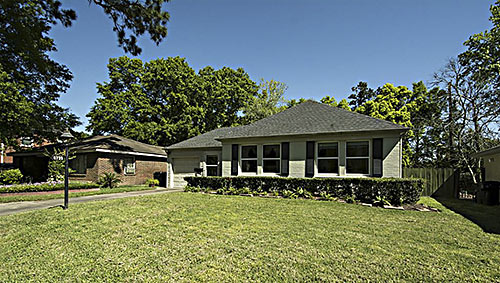
Doubled windows dominate the front of an updated 1946 Idylwood home. Each pair indicates a front-to-back section of the floor plan within. The south-facing property sits on a sloping lot in the neighborhood’s southeast corner; the street, which begins at Wayside Dr. just north of Walmart, eventually bends past the grassy banks of Brays Bayou. Over the weekend, the home popped up on the market as a listing seeking $265K. The same agent handled the property’s previous sale in 2008, when the current owner paid $185K before sprucing it up.
DRIVING BELTWAY 8, IN ORDER TO READ HOUSTON IN THE ORIGINAL 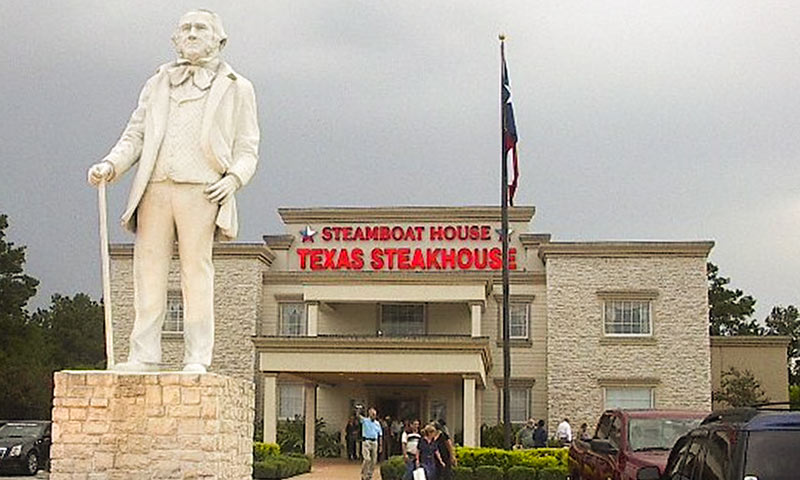 “To get a full sense of the place,” writes Cort McMurray, every Houstonian should travel Beltway 8’s full 83-mile circuit. Until you can find the time, though, his tour narrative may have to suffice: “Keep going. You’re not even halfway around. There are more factories, and more office buildings, more new construction, more traffic. There’s a steak house, built to look like Sam Houston’s Huntsville home, evidence that if you give a Houstonian a little time and a little encouragement and the right financing, a Houstonian will create something ridiculous, and the horse track, where nothing ever appears to be happening. Near Bush Intercontinental, you’ll endure Roadwork Purgatory: orange cones and narrowed lanes and blinking signs, and no evidence of any work being done. It’s been that way for 19 years.
East of the airport, the Beltway crosses vast swaths of tract homes and the strip centers and megachurches that inevitably follow them, funneling you toward the Jesse Jones Bridge, standing like the skeleton of some humongous sauropod, head forever bent to the Ship Channel, nosing about for some seaweed.” [OffCite] Photo of Steamboat House Steakhouse: Tomball Sesquicentennial Promenaders
“To get a full sense of the place,” writes Cort McMurray, every Houstonian should travel Beltway 8’s full 83-mile circuit. Until you can find the time, though, his tour narrative may have to suffice: “Keep going. You’re not even halfway around. There are more factories, and more office buildings, more new construction, more traffic. There’s a steak house, built to look like Sam Houston’s Huntsville home, evidence that if you give a Houstonian a little time and a little encouragement and the right financing, a Houstonian will create something ridiculous, and the horse track, where nothing ever appears to be happening. Near Bush Intercontinental, you’ll endure Roadwork Purgatory: orange cones and narrowed lanes and blinking signs, and no evidence of any work being done. It’s been that way for 19 years.
East of the airport, the Beltway crosses vast swaths of tract homes and the strip centers and megachurches that inevitably follow them, funneling you toward the Jesse Jones Bridge, standing like the skeleton of some humongous sauropod, head forever bent to the Ship Channel, nosing about for some seaweed.” [OffCite] Photo of Steamboat House Steakhouse: Tomball Sesquicentennial Promenaders
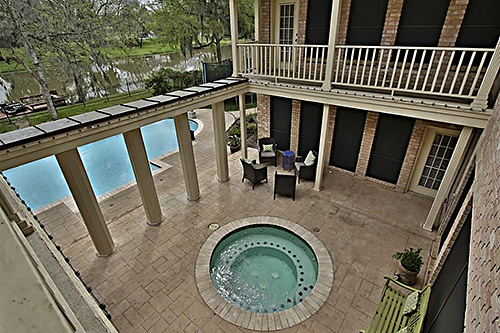

How did these townhomes under construction on the northeast corner of Bayou and Baron streets in the Fifth Ward come by their extra-long, tongue-like driveways? It’s not exactly clear, but the reader who sent these pix of the project and its rather prominent culvert-leaping flatwork thinks the answer might have something to do with a willingness to build well past the property line — or at least a lack of familiarity with where the property line actually is. The orange complex across the street, in the background of the photo above, is the Kennedy Place Apartments. Here’s a view of the townhomes from that side, looking east:
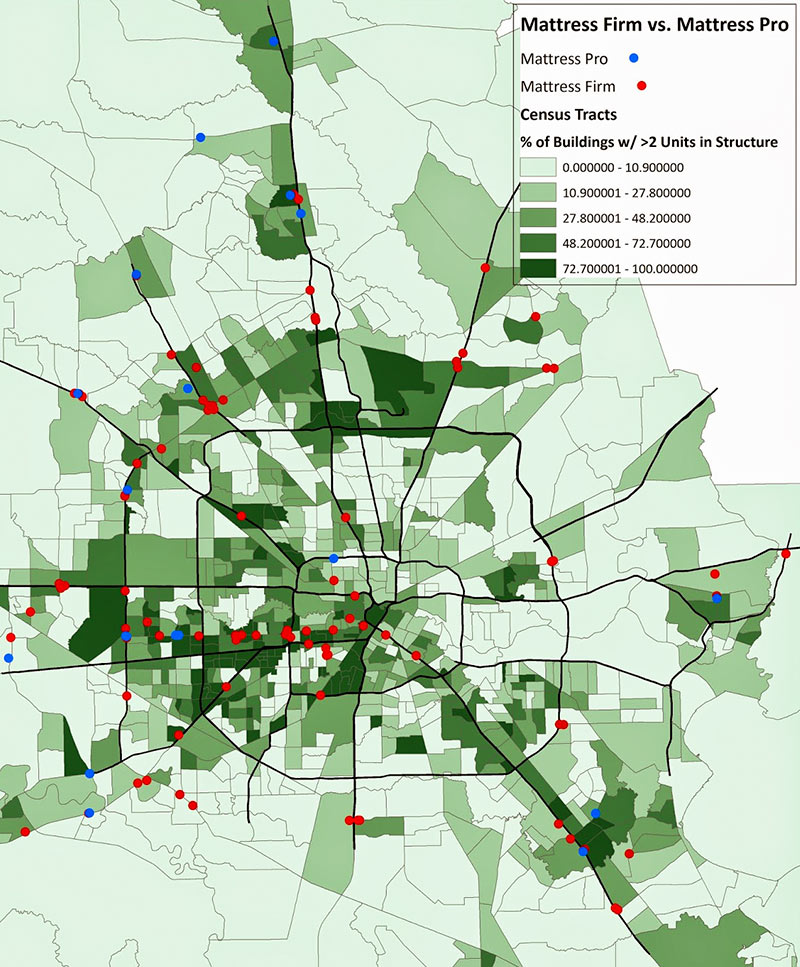

“Now we know why we seem to have hit peak mattress along Westheimer,” declares Christopher Andrews, after producing and walking through a series of maps intended to shed light on where in the Houston area and why Mattress Firm has opened 92 separate showrooms, and is working on another 19 for the lower-priced “competitor” the same company operates, Mattress Pro. The highlights from his analysis are the 2 maps excerpted here, showing (at top) the correlation between areas with lots of apartments (dark green) and the stores (red for Mattress Firm, blue for the usually outside-the-Loop Mattress Pro); and (above) a Learning from Las Vegas-style diagram of Houston’s very own Mattress Corridor.
Houston may be the sleepy chain store’s hometown, but it’s not the only beneficiary of all that new retail padding; in the 14 weeks ending February 3rd alone, Mattress Firm opened or acquired 118 new U.S. stores.
Maps: Christopher Andrews
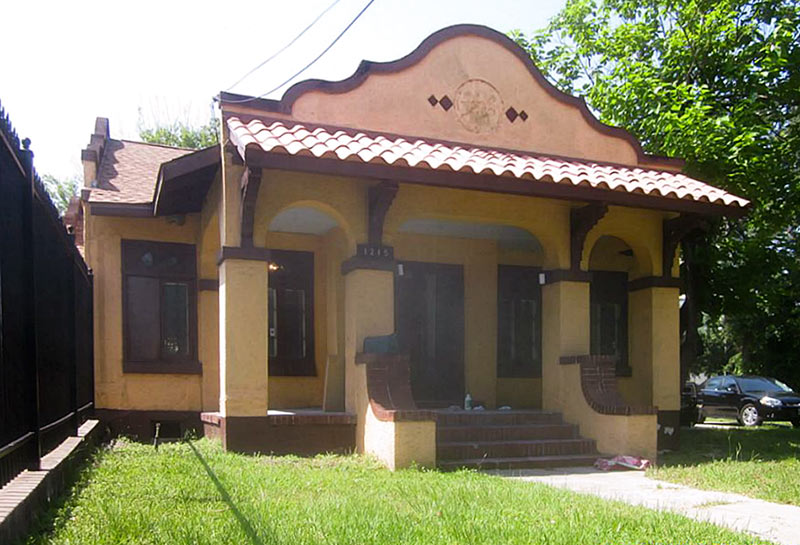
Swamplot’s Daily Demolition Report lists buildings that received City of Houston demolition permits the previous weekday.
A pretty big case of the munchies: